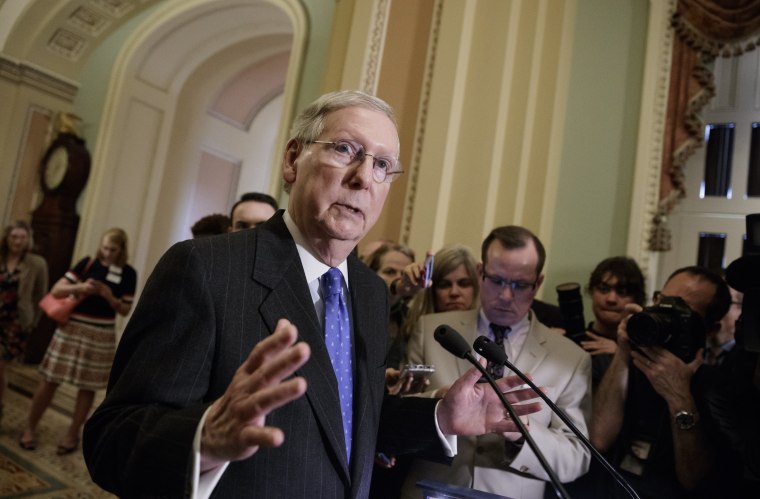Senate Majority Leader Mitch McConnell will almost certainly trigger the so-called nuclear option on Thursday, launching the legislative body into historic, uncharted waters in order to confirm Neil Gorsuch, President Donald Trump's Supreme Court Nominee.
Senators spent Wednesday debating the matter, but the outcome — a permanent change in rules that will affect both the Senate and the nation's highest court — has been as good as settled since at least week, and brewing for more than a decade.
The Senate is slated to hold a procedural vote, called a cloture around mid-day Thursday. Sixty votes are needed to end debate and move forward to a final vote that requires a simple majority of 51 to confirm Gorsuch.
But Democrats have enough votes to prevent, or filibuster that first step. When the cloture vote fails, McConnell is likely to begin the process of changing the rules to eliminate filibusters on Supreme Court nominations, with a vote on that expected later Thursday afternoon. Then the final up-or-down vote to confirm Gorsuch is expected to take place on Friday.
Related: What is the Nuclear Option and Why Does it Matter?
The Senate has been headed toward this confrontation for some time and senators on Wednesday spoke for hours about the reasons why. Sen. Jeff Merkley, D-Oregon kicked things off by speaking continuously for 15 ½ hours overnight Tuesday in protest to Gorsuch and Republican tactics.
And while Merkley and many others bemoaned the breakdown of Senate decorum, they proceeded along party lines in justifying this latest blow against the institution's rules history and rules.
“The core topic (of my all-night speech) is we are destroying the integrity of our core instructions in this nation. We need to pause and rethink that,” Merkley said.
The daylong debate on the Senate floor was full of finger pointing, with members of both parties claiming the Senate would not be in this situation if the other side hadn't played politics in the past.
And the erosion of Senate comity has been steady in recent years.
In 2005, when Republicans threatened the nuclear option because Democrats were blocking President George W. Bush’s judicial nominees, a bipartisan group of 14 senators, called the Gang of 14, diffused the escalation. They came to an agreement that Democrats would only filibuster in extreme circumstances. And the rules stayed intact.
Eight years later, President Barack Obama was in office and the Democrats had the majority. This time it was Republicans who blocked three of President Barack Obama’s judicial nominees to the D.C. Circuit, a powerful court that has oversight of the federal regulatory system.
There was no “gang” created but members held meetings, including an emotional bipartisan meeting in the Old Senate chamber in the Capitol, to try to come to a resolution.
But no resolution was found and Democrats used the nuclear option, voting to change the rules to allow all cabinet and judicial nominees except to the Supreme Court pass through the Senate with a simple 51-vote majority.
In a speech on the Senate floor at the time, then-Minority Leader McConnell warned Democrats that one day they will be in the minority. Now they are and the partisan grievances have piled up even higher.
Republicans remember the previous rules change while Democrats remain angry that Republicans refused to even consider President Obama’s Supreme Court nominee Merrick Garland last year after Justice Antonin Scalia’s death.
“The damage is being done because this seat is being stolen from one administration to the next,” said Merkley.
Just three of the original Gang of 14 are still in the Senate — Sens. Susan Collins, Lindsey Graham and John McCain. All three Republicans have said they will support the nuclear option Thursday.
Collins, the Maine Republican, said she had been “heavily involved” in discussions with Democrats that extended into the weekend to avert a rules change. Those talks yielded no settlement.
She talked Wednesday about what she thinks is the start of deep mistrust among senators.
“I think it goes back to the rule change in 2013. ... And the fact that so many members decided to—on the Democratic side— to filibuster an eminently well qualified court nominee. So I think it was the combination of those factors,” she said.
Senate Minority Leader Chuck Schumer, supported the rules change in 2013, but later said he regretted it. Now he's leading the Democratic filibuster.
"The truth is, each side can blame the other,” Schumer said on the Senate floor Wednesday. “We believe they’re more in the wrong; they believe we’re more in the wrong. The game of pointing fingers and ‘they started it’ can go back and back and back to the very founding of the Republic,” Schumer said.
This time, not enough members have stepped up to buck their party and end it.

